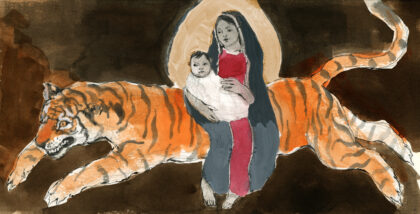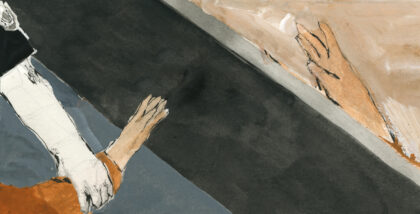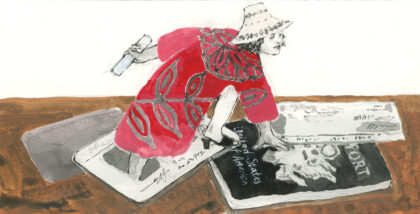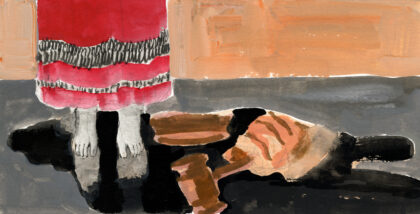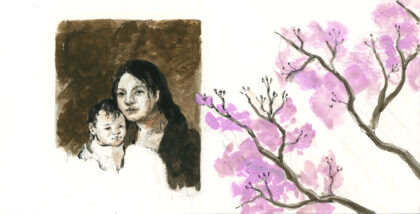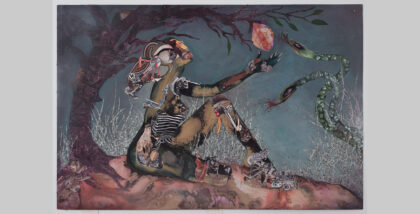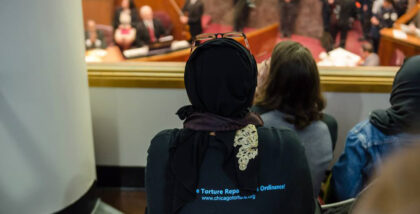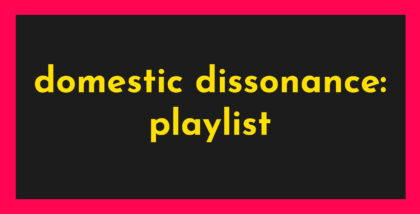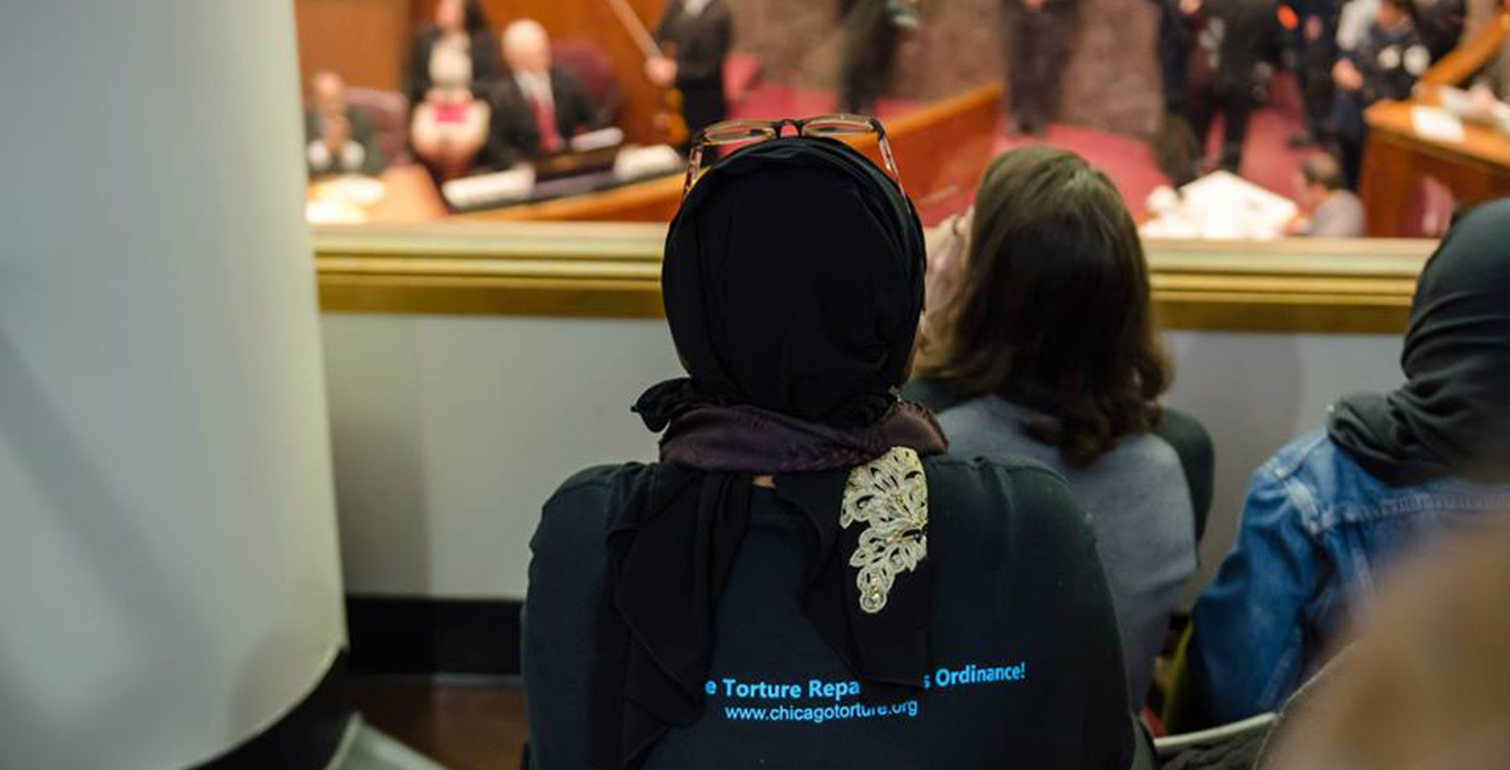 Image courtesy of Mariame Kaba
Image courtesy of Mariame Kaba
From Ella Baker to Septima Clark, history is rife with examples of Black women whose tremendous legacies in the world of political organizing are accompanied by a relative absence in the dominant narratives we tell ourselves about the times in which they lived. They say that fortune favors the bold; we might also observe that history favors the men.
And yet, as we continue to navigate the daily assaults against humanity lobbed at us by an authoritarian presidential administration, history may be on our side—if we choose to take a second look. One of the enduring gifts of the movement for Black lives is a renewed interest in another vision of leadership, starkly divergent from the one that prevailed in our elementary school history textbooks.
What if, after all, social transformation wasn’t about waiting for a designated [male, straight, cis, nondisabled] hero to come along and rescue us? What if regular people had the tools at our disposal to work collectively toward justice? As it turns out, those stories have been waiting for us all along, latent beneath the easier and more familiar tale of charismatic messiahs acting all alone. And they have much to teach us.
In this context, it is no surprise that those struggling to believe in something in the face of despair have turned to the work of educator and organizer Mariame Kaba. Many (myself included) came to her first through Prison Culture, the blog she has published since 2010 that explores the many arms of the carceral state and how we might dismantle our current systems of punishment. Others may know her from Project NIA, the organization she founded that uses participatory community justice to fight youth incarceration. Or one of the many other projects she has founded, co-founded or co-led: campaigns to free Marissa Alexander and Bresha Meadows, the Chicago Freedom School, the Chicago Community Bond Fund, We Charge Genocide, and Reparations Now, which secured reparations for victims of police violence in Chicago.
What unites these efforts, other than the fact that they have literally saved people’s lives, is that each of Kaba’s many projects offers teachable, replicable, participatory models for liberation. Always, she invites us to walk with her in struggle and solidarity, shining a light on the many ways that average people can make a more just world. And always, she takes the bold way, choosing imagination where others might choose compromise.
I spoke with Kaba about her family history, what it means to be an organizer, and the work she’s most proud of.
***
Eve L. Ewing: Talk to me about coming of age in New York in the ’80s. Your father was also an organizer?
Mariame Kaba: My dad had been involved in Guinea during the independence struggle. Guinea was the first among the French West African countries to seek independence, and that led to a lot of retribution by the French, sacking our libraries before they left, doing all sorts of stuff.
My father was then sent [to the US] by Sékou Touré, who became the first president of the country. They grew up together, and they were friends and comrades in the struggle together. They were all coming up on socialism and Marxism. [Touré sent them] to study different things so that they could basically, after the revolution, come back to build the country. My father was going to be a kind of Finance Minister; that was the notion.
[But] he started hearing rumors about what was going on post-revolution, which was that Sékou was consolidating power, and he was arresting some of the people who didn’t struggle, and locking them up in a prison called Camp Boiro. Camp Boiro became an infamous prison in West Africa known for the disappearing of thousands, and one of those people that he imprisoned and disappeared is my uncle. When that happened, my father was like, “This is not what we signed up for, and we were not fighting for this consolidation of power and eliminating our comrades who became their enemies because they dissent on one thing.”
He decided not to go back. So, Sékou’s pissed and tells the US to send my father back, to extradite him. The UN heard what was going on, and they gave him a blue passport, a UN passport, which meant that he could renounce his Guinea citizenship in order to be able to escape having to go back, because Sékou came to the US in a big pompous affair and came specifically to get my dad to go back. My father never talked about his life, never talked about this period because of such heartbreak.
Eve L. Ewing: Because Sékou was his friend.
Mariame Kaba: They fought together, and he loved him, and they loved each other. It also led to my family moving to the Ivory Coast, a large part; my grandparents, everybody, having to leave because of the political turmoil. My father never got to go back to Guinea again until 1986, and that was because Sékou died in ’84. He’d been told that if he set foot in Guinea he’d be arrested.
My father was always avidly interested in politics, and I grew up in a house full of books. That became my political education. And, listening to my father’s conversations about political struggles around the world; about socialism and its failings, about revolution and what people really mean by “revolution,” and what people don’t understand about what revolutions really do.
He always told me, “You have a responsibility to live in this world. Your responsibility is not just to yourself. You are connected to everyone.” He drilled this into us, to my siblings, “You have each other only. So, if you don’t get along, you fucking work that shit out because we’re not going to be here all the time, and we’re not going to be here forever. You have each other.” So we are close, close, close my siblings.
But then the second thing he said was, “You are interconnected to everyone, because the world doesn’t work without everyone.” You may think that you’re alone, but you’re never actually alone. This was really important because at a very young age that made me understand the importance of collectivity, and that we can’t do anything alone that’s worth it. Everything worthwhile is done with other people. So that became the soundtrack in my head.
My mother was in a different league altogether. She was not political in the same way, but she’s incredibly religious and very focused on charity in the sense of mutual aid. My friends were homeless—at the time we lived in the Lower East Side—and I recalled later on how strange it was that my mother just let people stay in our house. But she wasn’t going to let those kids stay outside when it was winter.
Eve L. Ewing: I see both of those things as such clear strands in your work. On the one hand, organizing collectively and building structures for freedom and resistance and resilience. And on the other hand, the theme of mutual aid. I wonder as well whether the anti-colonial framework, and global Pan-Africanist framework within which your father was working, influences the way you think about politics now.
Mariame Kaba: Always. Always. It made me an internationalist. I can’t imagine my organizing not being international, and not having an eye toward other people beyond the borders that I live in, and also questioning the idea of borders.
Eve L. Ewing: Do you think most US-based black organizers right now have that same internationalist awareness that folks had, say, in the ’60s where they were very much seeing anti-colonial struggles in Africa and Asia as being intrinsically related to black freedom struggles?
Mariame Kaba: I think it’s always been the case that some people were like that. In the ’60s, not all black revolutionaries or black organizers took that to the heart. I don’t know if Fannie Lou Hamer had a deep sense beyond Mississippi and the US borders. I know she fought like hell for everybody’s freedom, but I’ve never read her talking about that.
And in this [historical] moment it’s the same way. There are people who are incredibly focused on international struggles—people who are very prominent in the movement for Black Lives who go to South Africa and learn, talk to people in Brazil. They don’t happen to be the people that are elevated so they’re not getting big glossy magazine covers, but they’re the ones actually holding the infrastructure of some of these organizations together.
Eve L. Ewing: I would venture to say, with my own comparatively short memory, that the languages of repair, reparation, of certainly restorative justice, and also of abolition, are moving through discourse in a different way than they have been.
Mariame Kaba: Absolutely.
Eve L. Ewing: These are ideas that folks like you have been working on literally since before I was born, that are now being taken up. But what is being potentially misunderstood? Where do we need a course correction in our conversations there?
Mariame Kaba: That’s a really difficult question. Because I’m so uninterested in narratives. That word that gets used often. Narrative-building. People that want to be all about narrative-shifting, narrative-building.
I believe that when we are in relationship with each other, we influence each other. What matters to me, as the unit of interest, is relationships.
The second thing that matters to me as a unit of impact is harm. I want to figure out how to transform harm in every possible context because I have been harmed, and I have harmed other people. My political commitments are to developing stronger relationships with people, and to transforming harm. All those other things that you mentioned, the ideas only matter to me to the extent that they impact both those [commitments]. It is deeply offensive and hurtful to me that we have prisons because they break relationships and people. That’s how I feel about prisons—they are inherently made for isolation.
When they talk about repair and restorative justice, it’s all about relationships, and relationships in the context of harm. So, when people talk about these things as though they are just abstract ideas, or things that are just theory-building without connection to actual people’s lives, I can’t recognize it.
Eve L. Ewing: I think that makes perfect sense because it also is the consequence of what happens when people are learning about concepts primarily through—
Mariame Kaba: Reading.
Eve L. Ewing: Right. Like, “I read this interesting article,” as opposed to, “I believe in this.” Most black people in Chicago that I know who don’t believe in policing, it’s not because they read a great article that used debate and rhetoric to convince them, but because of their lived empirical experience.
Mariame Kaba: Angela Davis says this perfectly; she’s like, knowledge is built through struggle. It isn’t just built through somebody theorizing an idea. But through the struggle of it together, we come up with new concepts and ideas: that’s the best thinking.
Eve L. Ewing: Do you think it’s okay for folks to have different lanes? Where they’re like, “I’m just trying to organize for Philly right now,” for example. Or do you think that all organizers would benefit from more international experience?
Mariame Kaba: That’s a great question. I think we would all benefit from it, just in our political education, but I think it’s okay to have your own lane.
There’s been this struggle over the last few years of people talking about, “I’m just an activist and I just do things on my own. I don’t have anybody who is a base for me, and nobody holds me accountable.” And that’s not sustainable, and that’s also not organizing. That’s activism, and activism has its place and is important to do. Most organizers are activists also, but most activists are not organizers, and so we just have to be clear about what we’re trying to achieve.
But I do believe lanes are super important, and not all of us care about the same thing. That’s also okay. The same passion you feel about saving the whales, somebody else feels about saving pencils. It’s not a judgment; it’s just the fact that we have different interests.
Eve L. Ewing: Let’s talk more about organizing and activism because I think that that is a really important distinction. I do not identify as an activist. I am very frequently identified as an activist, which I find very puzzling. What do you see as the difference between those things?
Mariame Kaba: I think that people who are activists are folks who are taking action on particular issues that really move them in some specific way, but activism only demands that you personally take on the issue. That means signing petitions. Being on a board of a particular organization that’s doing good in the world.
That way, activist is super broad, and that’s why people call people activists. Your individual action, for example, of writing, can be a form of activism in the sense that it wants to educate people and get them to take action in their own way. You are in that way potentially being activist in your orientation, at least, if not in identity.
Organizers, however, can’t exist solo. Because who the hell are you organizing? You can’t just decide to wake up one morning and be like, “I’m just going to do this shit.” If you’re organizing, other people are counting on you, but more importantly, your actions are accountable to somebody else.
Organizing is both science and art. It is thinking through a vision, a strategy, and then figuring out who your targets are, always being concerned about power, always being concerned about how you’re going to actually build power in order to be able to push your issues, in order to be able to get the target to actually move in the way that you want to.
I have been an organizer for a big part of my life in the sense that I’ve been involved with other people in campaigns to move various things. But sometimes I’m just an activist.
But [in that case] I have no accountability to anybody, and that’s kind of dangerous. Because there are a lot of people doing a lot of shit that nobody can call them on.
Eve L. Ewing: Who is failed when that happens?
Mariame Kaba: I think that the people who are most directly impacted by the things people are doing are failed. Because they should have a say, and be part of the shaping of that thing that is about them. That’s critically important. But I also think that you yourself are failed if what you’re trying to do is do a hard large-scale thing and you don’t have any people.
Eve L. Ewing: Or you’re just trying to do it by yourself.
Mariame Kaba: It’s like, why?! You’re going to burn out. It’s not humanly possible for you to just be your Lone Ranger self out there in the world. Ella Baker’s question, “Who are your people?” when she would meet you is so important. Who are you accountable to in this world? Because that will tell me a lot about who you are.
And how much hubris must we have to think that us individual persons are going to have all the answers for generations worth of harm built by multi-millions of people? It’s like, I’m on a 500-year clock right now. I’m right here knowing that we’ve got a hell of a long time before we’re going to see the end. Right now, all we’re doing is building the conditions that will allow the thing to happen.
Eve L. Ewing: Furthermore, people who came before me have left me things that mean a lot to me that they will never live to see the fruition of. And so therefore it’s unreasonable for me to expect, “I’m going to fix this.” I think one of the biggest things we can do for ourselves is to recognize how, even as oppressed people, we have internalized the narrative of individualism.
Mariame Kaba: Capitalism is what helps us figure out the individualism part. It’s so married together. The itemization of everything into its own little sliver is capitalist. The other thing I learned from my friends, Mia Mingus and Leah Lakshmi and others who are disabled people in the world, is this notion of crip time. Folks who are disabled have to operate in the world in such a different register. That’s what Mia says all the time: the notion that we supposedly are not interdependent on each other can only exist in an ableist world. Because if you have any sort of disability, you desperately need a relationship with other people—you can’t be on your own or you will die. You have to recognize the interdependence, or build interdependence. You don’t have a choice. Crip time means, “We’re just going to get to it when we can.”
Disability justice gives us that real insight. I am not visibly disabled, but I’m chronically ill. Having lupus was a moment for me. The things I felt were super important were actually not that important—a re-frame of my whole entire existence—and I was like, oh, okay. “I can’t do this” meant something.
Eve L. Ewing: I want to circle back to visibility, and who is uplifted and not uplifted in movements. I sense you increasingly choosing visibility in different ways. I saw a picture of you in the New York Times and I was like, “Oh, my goodness.”
Mariame Kaba: I know.
Eve L. Ewing: So, I would love to hear your thoughts around why you generally choose to not be photographed, and some of your other choices around naming yourself, not centering yourself. And then ways in which that is changing, and why?
Mariame Kaba: That’s a really good question because it’s one of my struggle areas internally as a human being.
I grew up with mentors who taught me that the organizer is never up front. I would write things anonymously. I wrote a hell of a curricula, which I see still circulate today, with no attached name to it.
When I was in my 30s, I was doing a big curriculum project with a friend. She’s a white woman. We were finishing this project and I was like, “Oh, I don’t need to put my name on it.” I’m a believer in information access, free information access. I also don’t think my ideas are these original ideas. They belong to a lineage. So I always felt not proprietary.
She said, “It’s interesting to me. As someone who a lot of younger people look up to, younger women of color in particular, and your own interest in history, it’s so interesting to see you erasing yourself from history.”
Eve L. Ewing: She hit you with the “interesting”!
Mariame Kaba: Like daggers. She’s a very good friend of mine. But the fact that a white woman said that to me just messed with me. And did it from a place of real care, you know?
Eve L. Ewing: Yeah. “I just think it’s funny how…”
Mariame Kaba: “I just think it’s funny how you’re willing to erase yourself from history when you’re always recapturing histories of all these black women in your multiple projects, and you’re always talking about how you had to find them in the archives, right? And you’re literally erasing yourself at the moment. Also, it’s interesting that the younger people are seeing you do that.”
I was like, “Oh, wow.”
I took a breath, I thought about it really, really hard, and I was like, “You know what, actually? In part, she’s right.” In part, I still believe in just not centering myself. [But] she’s right in this sense: how are people going to be able to trace the lineage of ideas if I’m writing a whole bunch of things that no one knows I wrote, right?
That began the shift in my life around putting my name on my stuff. They email me from New Zealand and they’re like, “Thank you for putting out this thing. We’re using it.” I also know that the ideas are traveling, and that makes me feel good about that work, and I never got that before. So, that was a gut-check moment for me around being like, “At least put your name on your shit.”
Eve L. Ewing: What are you most proud of?
Mariame Kaba: Of all the campaigns that I’ve been part of, probably Reparations Now [which secured reparations for victims of police violence in Chicago].
Eve L. Ewing: Because we won!
Mariame Kaba: We won, but it’s not the win. It’s this: nothing that we do that is worthwhile is done alone. That could not be more true about that whole experience, the collective way in which we worked together, the survivors and their families and all the people who just came in to support the lineage of it, and the fact that there had been 35 years of struggle before that win. We couldn’t have won without those 35 years. All the people who are no longer here whose ideas and thought and energies went into that, that we held for the kind of finale campaign that seized the moment of possibility. And that we knew it was a moment of possibility is so important, because so often you don’t know when the moment of possibility is and it just passes you by.
I had on purpose not been involved deeply in the organizing earlier because it was so litigation focused. I would tell my friends, “I love you all. [But] I can’t get too deeply involved in this. I can come to the rally, but I just don’t think this is going to yield what you hope it’s going to yield, and I don’t think people are going to feel the emotional satisfaction you all think is going to happen when this guy goes to prison.”
Eve L. Ewing: When you say litigation focused, you mean specifically around litigating Jon Burge [the Chicago police commander notorious for torturing people into giving false confessions]?
Mariame Kaba: Yeah. Prosecution, jail, and all these cops going to jail. Then, Joey Mogul [a Chicago-based attorney at the People’s Law Office, known for representing victims of police torture] came to me in late 2010 or early 2011 and said, “I hear you. We had these conversations for years, and everybody’s left empty now that Burge [was convicted of perjury and obstruction of justice]. The survivors who remain haven’t gotten anything, and the statute of limitations [for torture victims] has run out, and we have no court recourse. It’s got to be political, and also I have evolved on abolition myself.”
It wasn’t a mea culpa; it was just a recognition that we need something else, and what can we do? That’s when art was the offering. We said, let’s ask people for [ideas for] secular memorials, and that reparations ordinance was one of the secular memorials.
All the things people talk about are in the abstract, but it’s not. It is about listening to feelings from our imaginations, right? Art can be uniquely situated for that. That’s why cultural work is an organic part of organizing, even when organizers don’t know it.
Eve L. Ewing: Artists are always there.
Mariame Kaba: They’re there. They’re there as the people to help us think through it. Why does this have to be? It doesn’t have to be like this. You can think of something totally fucking different. Why are you all stuck in the presentist moment? You can dream a future. We need that so desperately in the world.
Eve L. Ewing: Who are your heroes?
Mariame Kaba: God, I have so many touchstones. I believe in touchstones, people who you go back to in particular moments where you need something.
I turn to Baldwin a lot. I read him when I’m feeling a sense of despair over the world that I’m in. I find a sentence that he wrote and it’s like, “Ooh, yes.”
I think about so many of the black communist and socialist women of the first part of the century. If they could go through what they went through, if Marvel Cooke could go through the Red Scare and through being fired by the Amsterdam News—she was the first woman working there ever— if she can endure that in the 1930s, what am I doing? You know what I mean? Now, I have so much more at my disposal. I’m so much less oppressed.
I love Ida B. Wells-Barnett. I love reading her journal where she’s lamenting that she can’t stop spending money, like, why did I buy that scarf? My God. Why am I spending this money? And it’s beautiful because it shows you this woman who fearlessly went to the South by herself to literally take down people’s testimony after a lynching, just sitting around saying, why can’t I fucking stop shopping? Why did I buy this super expensive scarf that I cannot afford? It makes me so happy to go back to that and read that passage and be like, “Yes, Ida!”
Eve L. Ewing: And to reclaim the humanity of black women also, you know? There’s one part in her autobiography where she’s like, I think I was the first person to do a speaking tour while nursing a baby. Sometimes her baby cried in the middle of her thing and she was embarrassed, and she had to go out.
Mariame Kaba: That image of her going to that meeting and Harriet Tubman being there, and Ida giving her son to Harriet Tubman, and Harriet Tubman raising the son and calling him the movement’s baby?! Oh, my God. I love that shit.
Angela Davis is a huge touchstone for me. Ruthie [Wilson Gilmore] is a touchstone for me. Beth [Richie] is a touchstone for me. A lot of black feminist women that I’ve been able to be in space with in real life. Some who’ve given me a way of being in the world. Modeling grace in moments that are really not graceful.
Camara Laye is a beautiful Guinean writer who I love reading. Also Walt Whitman; I love his poetry. I will read and get influences from everyone.
Eve L. Ewing: What questions are plaguing you right now?
Mariame Kaba: How are we going to organize ourselves in this proto-fascist moment in the US and around the world? The how of it is what I’m stuck on. I’m not stuck on the capacity of us to do it.
Eve L. Ewing: Do you believe we can do it?
Mariame Kaba: Not only do I believe it; I know we can. Because people have. People lived through the ’20s and ’30s. A lot of people died, but a lot of people lived, and people fought. It did take war. I think about war a lot. I think about it in the context of abolition, knowing full well that there could have not been an abolition to challenge slavery without the civil war.
Frederick Douglass—everybody thought he was a militant psychopath because he kept saying, “The war had to come. We’re going to have to go to war. That’s the only way we’re going to be able to get out of this.” And people, including black people, saying, “No, no, no,” and “Stop using this term,” and “ We don’t want to go to war,” and him saying that’s the only way.
Eve L. Ewing: “That’s dangerous.”
Mariame Kaba: You are literally harming us with that talk. We are in a position where they’re going to come and shoot all of us down, and you’re fucking out here making these speeches about war. What he must have had to sit with in that moment of time, when it was unclear whether there would be one, and still say, “It must happen,” and then 600,000 deaths later… Right? To sit in that.
Eve L. Ewing: A war that our country is not over. Not remotely over.
Mariame Kaba: Not even close to being over. So, I’m thinking a lot about how we’re going to organize ourselves in this moment, in our oppressive proto-fascist moment, and I’m thinking about if we’re going to need war again in order to actually facilitate the next phase of the long abolitionist phase. Kind of the third Reconstruction that some people are talking about.
Then, I’m thinking a lot about blackness in the 21st century. Because there are Native people, indigenous people the world over, having survived eliminationist policies, having survived genocide… Where are we in relationship to them? We need deep solidarity and co-strugglership with folks. But while we need that more than ever, we’re in a conversation right now over land trust around reparations in the US and other parts of the world, when we are not on our land. There were people here.
Eve L. Ewing: Folks don’t know what that layer of colonialism is, or what that means.
Mariame Kaba: And don’t want to know. Even people who know about settler colonialism say, “No. We still actually have a claim on land.”
Eve L. Ewing: Right. I don’t know how we’re going to work that out.
Mariame Kaba: We work it out by permission. The very things we’re talking about doing in restorative justice and repair, we have to internalize those values within our conversation with people. I’m okay with having conversations about black people having landed in the United States, people whose ancestors were enslaved toiling this land, coming here without choice, being brought here, but your work is still permission-driven because there were people here, even though you came against your will. There were people here already. So, what do you owe to that and to them?
Eve L. Ewing: The problem with that is it requires relationships, right?
Mariame Kaba: This is the point, and we don’t have any.
Eve L. Ewing: If we were in relation to each other already, already united in struggle, and have read each other’s things, and talked through each other’s things, and showed up for each other, then we could sit down and be like, “Okay. Let’s have a difficult conversation.”
Mariame Kaba: “You know our history; we know yours.” So, I’m thinking about blackness in the 21st century, I’m thinking about war, I’m thinking about fascism, and I’m also thinking about gender and violence all the time.
Eve L. Ewing: Well, now I feel like I have to end on some sort of positive note. But I don’t. I guess no one is going to open the Eve Ewing/Mariame Kaba interview and be like, “I’m ready to feel great. I’m ready to feel good.”
Mariame Kaba: People should. You know why?
Eve L. Ewing: Why?
Mariame Kaba: I’m going to tell you why. The reason I’m struggling through all of this is because I’m a deeply, profoundly hopeful person. Because I know that human beings, with all of our foibles and all the things that are failing, have the capacity to do amazingly beautiful things, too. That gives me the hope to feel like we will, when necessary, do what we need to do.
But one of the important things is identifying where the issues are—and I don’t think hiding from that, and pretending like everything is possible, everything is good—but to be rigorous, and to be clear-eyed. “This is fucked up, and what can we be doing?” It’s not the individuals. I would be very depressed if it only was up to me to solve every problem in the world, but it’s not. Or you.
I look at the evidence, I see the fucked-up-ness of it, and I always stick to the possibilities that exist, still, for us to have more freedom, to get toward that thing, the horizon that we’re all trying to work for.
